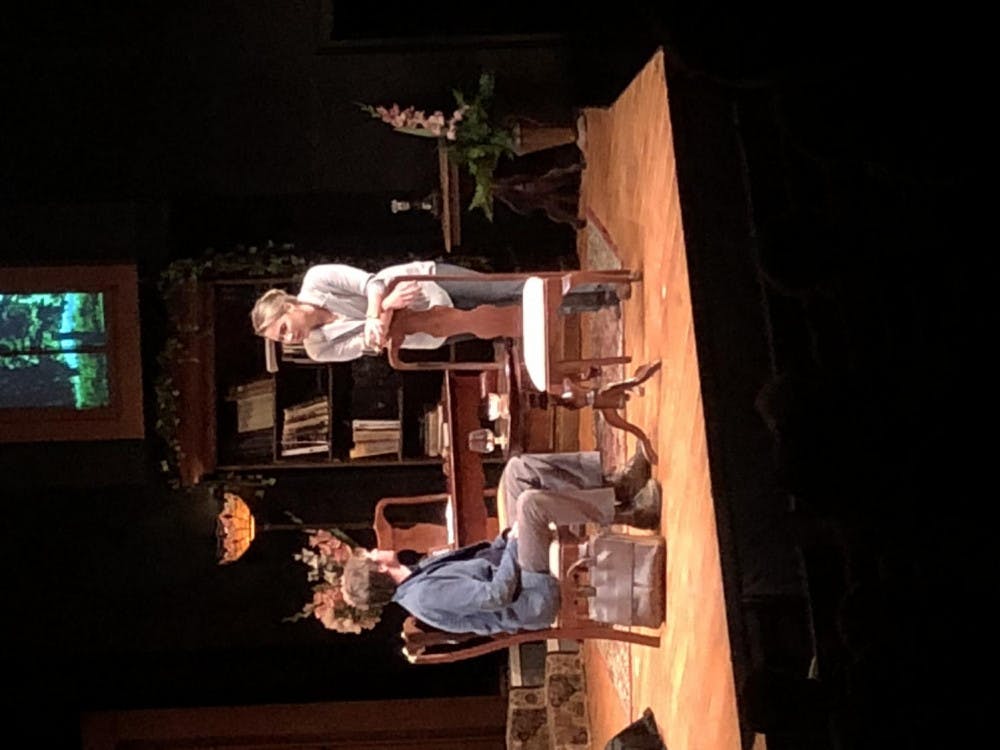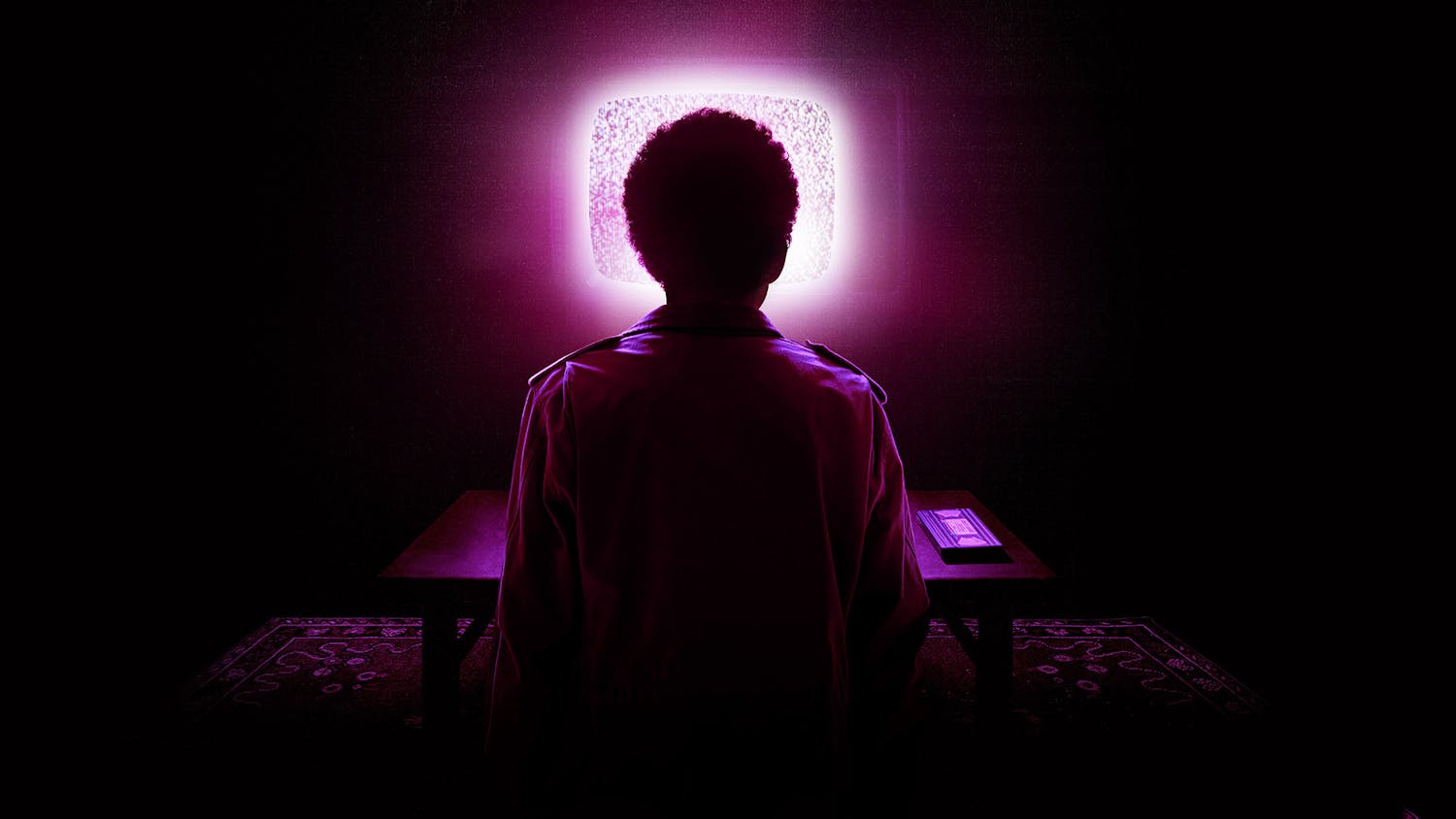As human beings, we are always balancing risks, personal gain and a commitment to our values. A willingness to look our personal failings in the face is especially needed in present-day Washington, where recent administrations have aggressively prosecuted whistleblowers, and governments conduct broad surveillance and respond to dissent with increasing militarization. The kind of incisive analysis we need was put on display in “Havel: The Passion of Thought.”
The Department of Theatre and Dance presented the series of five plays by Václav Havel, Samuel Beckett and Harold Pinter from Nov. 1 through Nov. 3. The show featured Kevin Collins ’20 as Vanek and was directed by Professor of Theater Richard Romagnoli.
“This was also an especially special show and rehearsal process since it is Professor Richard Romagnoli’s final semester teaching at Middlebury,” said Ashley Fink ’18.5, who played Vera. “I know we were all honored to be a part of his last show before retiring.”
The evening began with “New World Order,” a short play by Harold Pinter which, according to Romagnoli, was chosen to “show the protagonist’s journey coming into a full circle.” “New World Order” shows Collins in an interview room, minutes prior to his interrogation by two officers, Des, played by Ian Hanson ’21, and Lionel, played by Jacob Morton ’21. The officers discuss, in bullish tones, what they intend to do with the third man, who is blindfolded. What they intended were acts of violence and abuse to not only the man himself but his wife and family, representing the forms of torture that many dissidents had to take while fighting against communism to restore the basic rights of its citizens.
Referred to together as “The Vanek Plays,” the next three pieces focus on Havel’s alter ego, Vanek, a person whose own presumed moral purity inspires his fellow characters to justify their moral breaches. People — his friends as well as employers — play up to him, trying to win his absolution with favors. The plays were initially banned in Czechoslovakia and only premiered in Prague on the week of Jan. 13, 1990, when Havel became president of the Czech Republic.
In the first of “The Vanek Plays,” Vanek is working as a laborer in a small Czechoslovak brewery, which Havel himself did, and is called for an interview with the brewmaster, played by Will Koch ’21. Though the two chat in a friendly manner, it is later understood that the brewmaster is a die-hard bureaucrat, tempting Vanek to take an office job in return for Vanek to furnish him with reports of Vanek’s own political activity. Surprised, Vanek explains how he is not willing to report about himself.
“In each of the plays,” Romagnoli said, “the status quo is represented by the others who condemn him [Vanek] for his apparent indifference to their needs. They all need him to affirm their individual choices of non-involvement, therefore, mitigating their guilt.”
The second play, titled “Private View,” finds Vanek in the bourgeois household of a married couple, Michael and Vera, played by Galen Fastie ’20 and Fink respectively, who have fled the Czechoslovak nation during the Prague Spring and survived with their flamboyant riches. They have decorated their apartment with luxurious goods, and their clothes are that of an affluent American suburb. Vanek, in comparison, looks shabby. With ridicules and jokes that rise to surrealism, Vera and Michael attempt to present how beautiful their lives are to their “best” friend. Vanek is initially quick to be pleased; however, when the conversations veer off to his family and his wife, he becomes resistant.

Perhaps the most affecting of the plays was “Protest,” when Vanek visits his friend Stanekova, played by Madeleine Russell ’19. Stanekova is a former friend and novelist who has given up her art and her honor, fearing oppression and jail time. She meets Vanek in attempt to publish a protest against the arrest of a young neo-reformist. When Vanek provides her with a signed petition that he had previously drafted, she refuses to sign the petition believing that it was the righteous thing to do. Prior to getting to that decision, she uses convoluted logic that turns every positive into negative to assure herself of the rectitude of moral abdication. She also later receives a phone call and apologizes to Vanek for collaborating with the government for his later imprisonment.
In the initial plays, Stanekova was a man; however, under Gail Humphries Mardirosian’s thoughtful direction, Stanekova was created to mirror the interactions and utter the same lines as the men. This is important as we see a woman in the role of a government collaborator in a male-dominated political field, a change that Romagnoli took account of while directing the play.
Romagnoli chose “Catastrophe,” a play by Samuel Beckett, to end the show. “Catastrophe” was written to honor Havel and according to Romagnoli, “the extended context is unified by the protagonist [Havel]’s presence and ironically, demonstrates the consequences of principled actions taken in a totalitarian state.”
Although Havel’s plays were written about the powerlessness that he felt in a time of political oppression and how to live a life in service of the truth in the context of 1970 Czechoslovakia, his message is an apt one for any era.
‘Havel’ Explores Morality and Dissidence

Kevin Collins '20 and Madeleine Russell '19 in "Protest," one of five plays that made up "Havel: The Passion of Thought."
Comments



